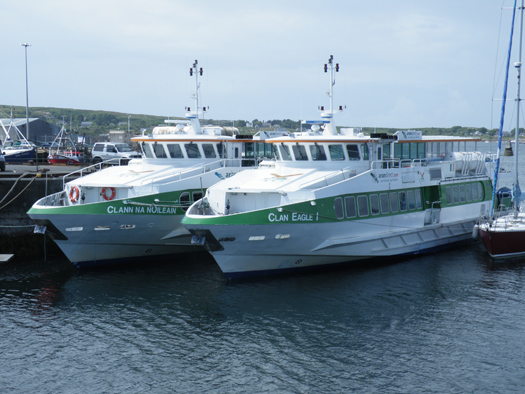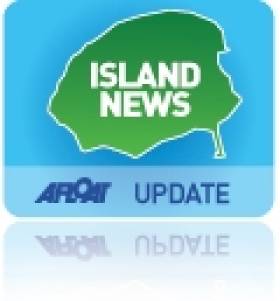Displaying items by tag: Clann na Oileain
Aran Island Fast-Ferries Sold to Mauritius Operator
The sale follows a previous attempt to dispose of the 234-passenger capacity ferries at an auction in Galway last month. Despite bids reaching €950,000, they were withdrawn at the auction which was also hosted by the Cork based auctioneer.
The vessels remain in Rossaveal but they will be transferred onto a cargoship as 'deck-cargo' to make the long delivery journey across the high seas for the new owners. Mauritius is neighboured by the smaller islands of Agalega, Cargados Carajos and Rodrigues which together form the Mascarene Islands, with the French island of Réunion some 200km to the southwest.

Sisters Clann na nOileáin and Clann Eagle I moored at Rossaveal. Photo
Jehan Ashmore / ShipSNAPS
With a streamlined aluminium 26m mono-hull design the vessels are capable of 19.7 knots. When the craft were constructed in 2006 they were worth between €5 and €6m. The pair were built in France by the OCEA boatyard at Les Sables d'Olonne, on the Bay of Biscay coastline, for Bád Arann Teo (trading as Aran Direct).
The company which went into receivership, operated on routes between Rossaveal and the Aran Islands (Oileáin Árann) of Inishmore (Inis Mór) Inishmaan (Inis Meáin) and Inisheer (Inis Oírr).
In recent years, Aran Direct had intended to introduce a larger passenger-only catamaran ferry on a new route between Galway and Kilronan, the capital of Inishmore and the largest of the three islands.
The fast-craft catamaran envisaged for the route was the U.S. based, 37m Harbour Lynx (2003/427grt) formerly Angel of Freedom, with a capacity for 300 passengers.To be renamed Aran Princess, the vessel was scheduled to take only an hour's passage time across Galway Bay.
In addition the revived route would have been the first direct 'passenger' carrying link between Galway City to the Aran Islands, since the closure in 1988 by CIE (Córas Iompair Éireann) of the three-hour route operated by the Naomh Éanna (1957/438grt).
























































